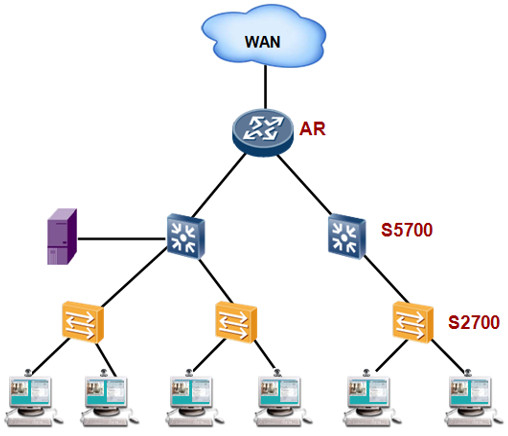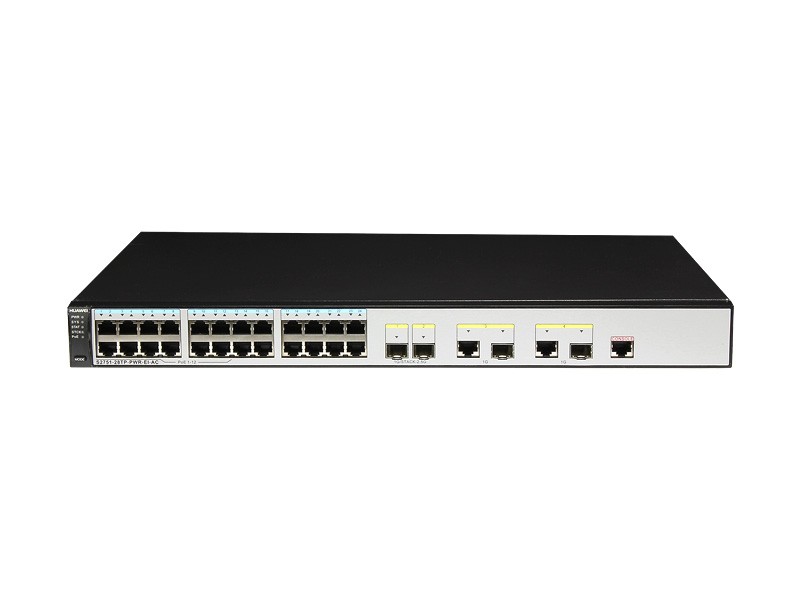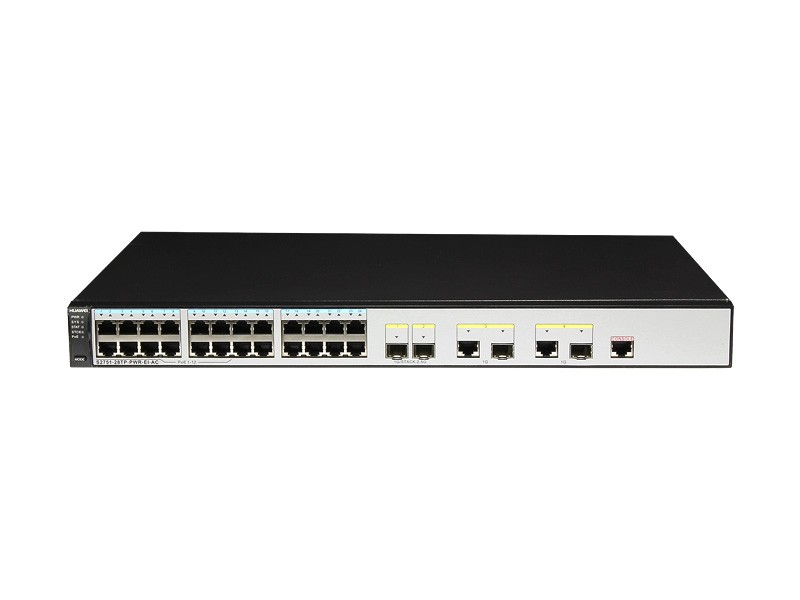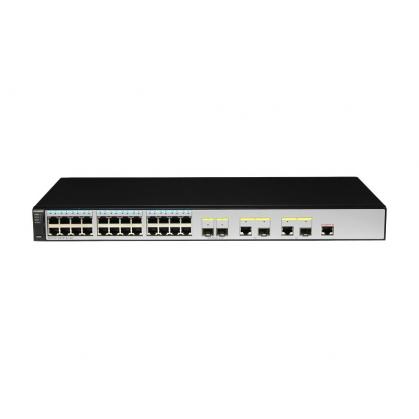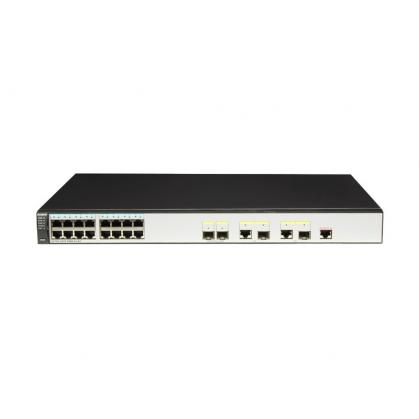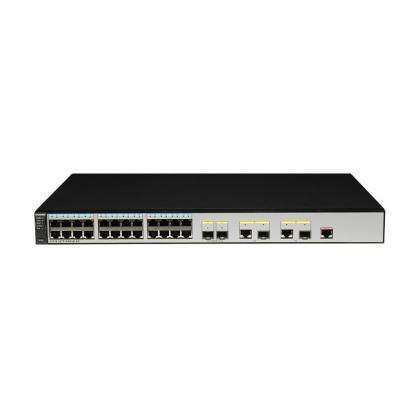S2751-28TP-PWR-EI-AC
-
Model:
S2751-28TP-PWR-EI-AC Huawei S2700 Series Switch -
Detail:
S2751-28TP-PWR-EI-AC(12 Ethernet 10/100 PoE+ ports,12 Ethernet 10/100 ports,2 Gig SFP and 2 dual-purpose 10/100/1000 or SFP,AC 110/220V) -
Price:
$900.00
- Free Technical Support
- Product Quality Protection
- On-time Shipment
- +86 755 8215 3862
- leo@uonel.com
- ywx39894
Product overview
S2700 series enterprise switches, including S2710, S2720, S2750, and S2751 series, are next-generation, energy-saving intelligent 100M Ethernet switches developed by Huawei. The S2700 uses cutting-edge switching technology and Huawei’s Versatile Routing Platform (VRP) software to meet the demand for multi-service provisioning and access on Ethernet networks. They are easy to install and maintain. With its flexible network deployment, comprehensive security, Quality of Service (QoS) policies, and energy-saving technology, the S2700 helps enterprise customers build next-generation IT networks.

|
Product Code |
S2751-28TP-PWR-EI-AC |
|
Downlink Ports |
12 Ethernet 10/100 PoE+ ports 12 Ethernet 10/100 ports |
|
Uplink Ports |
2 Gig SFP and 2 dual-purpose 10/100/1000 or SFP |
|
PoE |
Supported |
|
Forwarding Performance |
9.6 Mpps |
|
Switching Capacity |
64 Gbit/s |
|
Power |
AC power supply |
|
Heat Dissipation |
Natural Heat Dissipation |
|
Dimensions (W x D x H) |
442.0 mm x 310.0 mm x 43.6 mm |
|
Weight (Kg) |
5.4 Kg |
Product characteristics
Easy operation
- The S2700 supports easy installation, configuration, monitoring, and troubleshooting and greatly reduces initial installation and configuration costs, improves upgrade efficiency, and lowers engineering costs. It provides a web Network Management System (NMS) with a user-friendly Graphical User Interface (GUI) to implement alarm management and visual configuration and facilitate operation and maintenance. In addition, it supports faulty device replacement without configuration
- The S2700 offers a new Application-Specific Integrated Circuit (ASIC) switching technique and a fan-free design. This design reduces mechanical faults and protects the device against condensed water and dust damage
Flexible service control
- The S2700-EI supports various ACLs. ACL rules can be applied to VLANs to flexibly control ports and schedule VLAN resources
- It also supports port-based VLAN assignment, MAC address-based VLAN assignment, protocol-based VLAN assignment, and network segment-based VLAN assignment. These secure and flexible VLAN assignment modes are used in networks where users move frequently
- The S2700 supports GARP VLAN Registration Protocol (GVRP), which dynamically distributes, registers, and propagates VLAN attributes to ensure correct VLAN configuration and reduce network administrator workloads. In addition, the S2700 supports SSH v2, HWTACACS, RMON, and port-based traffic statistics. The Network Quality Analyzing (NQA) function assists users with network planning and upgrades
Excellent security features
- The S2700 supports DHCP snooping, which generates user binding entries based on users’ access interfaces, MAC addresses, IP addresses, IP address leases, and VLAN IDs. The DHCP snooping function protects against common attacks such as bogus IP packet attacks, man-in-the-middle attacks, and bogus DHCP server attacks
- The S2700 can limit the number of MAC addresses that can be learned on an interface to prevent attackers from exhausting MAC address entries by using bogus source MAC addresses. This function minimizes packet flooding, which occurs when users’ MAC addresses cannot be found in the MAC address table. The S2700 can also limit the number of ARP entries to prevent ARP spoofing attacks. In addition, it provides an IP source check function to prevent malicious users from using spoofed IP addresses to initiate DoS attacks
- The S2700 supports centralized MAC address authentication and 802.1x authentication. It authenticates users based on statically or dynamically bound user information such as IP address, MAC address, VLAN ID, and access interface. VLANs, QoS policies, and ACLs can be dynamically applied to users
PoE function
- The S2700 PWR series supports improved Power over Ethernet (PoE) solutions and can determine if and when a PoE port provides power. The S2700 PWR can use PoE power supplies with different power levels to provide the PoE function. Powered devices (PDs) such as IP Phones, WLAN APs, and Bluetooth APs can be connected to the S2700 PWR through network cables. The S2700 PWR provides -48V DC power for the PDs
In its role as power sourcing equipment (PSE), the S2700 PWR complies with IEEE 802.3af and 802.3at (PoE+), and can work with PDs that are incompatible with 802.3af or 802.3at (PoE+). Each port provides a maximum of 30W of power, complying with IEEE 802.3at. The PoE+ function increases the maximum power available on each port and provides intelligent power management for high-power consumption applications. This process facilitates the ease of PD use. PoE ports are still able to work while in power-saving mode.
High scalability
- The S2700 uses Intelligent Stack (iStack) to virtualize multiple switches into a single logical device to ease user management and configuration and expand system switching capacity. iStack improves switching capacity, reliability, and scalability. Additionally, after the stack is established, all the member switches in a stack use the same IP address. You can use a single IP address to manage and maintain the switches uniformly. This greatly reduces system O&M costs
- iStack architecture is designed for rapid failover capability with n-1 master redundancy, distributed Layer 2 and Layer 3 switching, link aggregation across the stack, and within 200 ms failover for path failure and hitless master/backup failover
- Besides traditional STP, RSTP, and MSTP, the S2700 supports enhanced Ethernet technologies such as Smart Link and RRPP, implements millisecond-level protection switchover for links, and ensures network quality
- The S2700 supports Smart Ethernet Protection (SEP) protocol, a ring network protocol applied to the link layer of an Ethernet network. SEP provides millisecond-level service switchovers and ensures nonstop forwarding of services. In addition, SEP features simplicity, high reliability, high switchover performance, convenient maintenance, flexible topology, and enables users to manage and plan networks conveniently
- The S2700 supports G.8032 Ethernet Ring Protection Switching (ERPS). TERPS is based on traditional Ethernet MAC and bridging functions. It uses the mature Ethernet OAM and Ring Automatic Protection Switching (Ring APS or R-APS) technologies to implement millisecond-level protection switching on Ethernet. ERPS supports various services, flexible networking, and lowers OPEX and CAPEX
Comprehensive QoS policies
- The S2700 supports complex traffic classification based on packets’ TCP/UDP port numbers, VLAN IDs, source MAC/IP addresses, destination MAC/IP addresses, IP protocols, or priorities. By limiting traffic rate based on traffic classification results, the S2700 implements line-speed forwarding on each port to ensure high-quality voice, video, and data services. Each port supports a maximum of eight queues and multiple queue scheduling algorithms, such as WRR, SP, and WRR + SP
Powerful surge protection capability
- The S2700 uses Huawei-patented surge protection that supports 7 kV surge protection capability on service ports. This effectively protects switches against over-lightning induced over-voltage. This surge protection technique reduces the possibility of equipment being damaged by lightning, even in extreme situations or in scenarios where grounding is not feasible
Quiet operation, energy conservation, and low radiation
- The S2700 uses an energy-saving integrated circuit design to ensure uniform heat dissipation. Idle ports can enter a sleep mode to further reduce power consumption. The S2700 makes no sound because it does not contain any fans. Radiation produced by the S2700 is within the standard range for electric appliances and is harmless to people
-
Networking and applications
100 Mbit/s access rate for terminals
- The S2700 can function as a desktop access device that provides an access rate of 100 Mbit/s for terminals and 1,000 Mbit/s for uplink interfaces to communicate with uplink devices.
